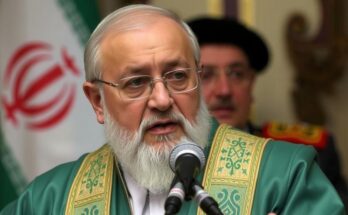The Middle East crisis intensifies as Qatar’s Emir accuses Israel of aggression in the West Bank and Lebanon, while Netanyahu reportedly confines military strikes against Iran to military targets. UN peacekeepers face escalating risks amid clashes, prompting international condemnation of attacks against them. The situation in Gaza remains dire, with significant civilian casualties reported. Regional and global leaders call for de-escalation and adherence to humanitarian laws.
The ongoing crisis in the Middle East has escalated tensions between Israel and various entities, including Iran and Hezbollah. The Emir of Qatar, Sheikh Tamim bin Hamad Al-Thani, criticized Israel’s actions in the West Bank and Lebanon, accusing it of executing premeditated aggression. During his annual address to the Shura Council, he condemned Israel’s ongoing military operations, describing them as a manifestation of impunity and termed the regional conflict a “collective genocide.” Reports indicate that Israeli Prime Minister Benjamin Netanyahu has communicated to the Biden administration his intention to limit military strikes against Iranian interests to military targets, thereby refraining from attacking facilities related to oil and nuclear capabilities. This decision comes in light of recent missile attacks from Iran, suggesting a tactical shift in Israel’s military strategy while seeking to avoid further escalation of conflict that could involve U.S. military intervention. Concurrently, the UN Security Council expressed its distress over the injuries sustained by UN peacekeepers due to ongoing hostilities involving Israeli forces and Hezbollah in southern Lebanon. The council reiterated that United Nations personnel must not be targeted during military engagements, stressing the importance of safeguarding UN missions in the region. Israel’s recent airstrikes in Lebanon, which resulted in numerous casualties, have drawn sharp rebuke from several nations, including European powers, who called for an immediate cessation of attacks against UN peacekeepers. Israel has denied deliberately targeting UN forces, claiming that Hezbollah uses these positions to launch assaults against Israeli troops. In the Gaza Strip, the humanitarian crisis has worsened, with extensive civilian casualties reported amidst Israeli military actions. The Palestinian health ministry reported substantial casualties since the conflict escalated earlier this month, prompting international calls for adherence to humanitarian laws and protection of civilians. Netanyahu is also exploring a strategy to halt humanitarian aid to northern Gaza, potentially exacerbating the suffering of the local population.
The article discusses the critical developments in the Middle East, particularly the rising tensions between Israel, Iran, and Hezbollah, as well as the involvement of the international community, including the UN and various nation-states. Qatar’s Emir’s comments reflect wider Arab concerns about Israeli military actions and their implications for regional stability. Netanyahu’s reported military strategy shift highlights Israel’s ongoing conflict with Iran without provoking a direct U.S. involvement. The humanitarian situation in Gaza has garnered significant international attention, with rising civilian casualties prompting calls for compliance with international humanitarian laws. The UN peacekeeping force’s role in Lebanon further complicates the situation, as clashes between Israeli forces and Hezbollah continue to inflict harm on both combatants and peacekeepers.
In summary, the current Middle East crisis centers on the interplay of military aggression between Israel, Iran, and Hezbollah, alongside significant humanitarian challenges faced by civilians, particularly in Gaza. International responses indicate growing concern over Israel’s military tactics and their implications for global security and humanitarian principles. The UN’s involvement underscores the need for diplomatic solutions to cease hostilities and protect all civilians within the conflict zones.
Original Source: www.theguardian.com



